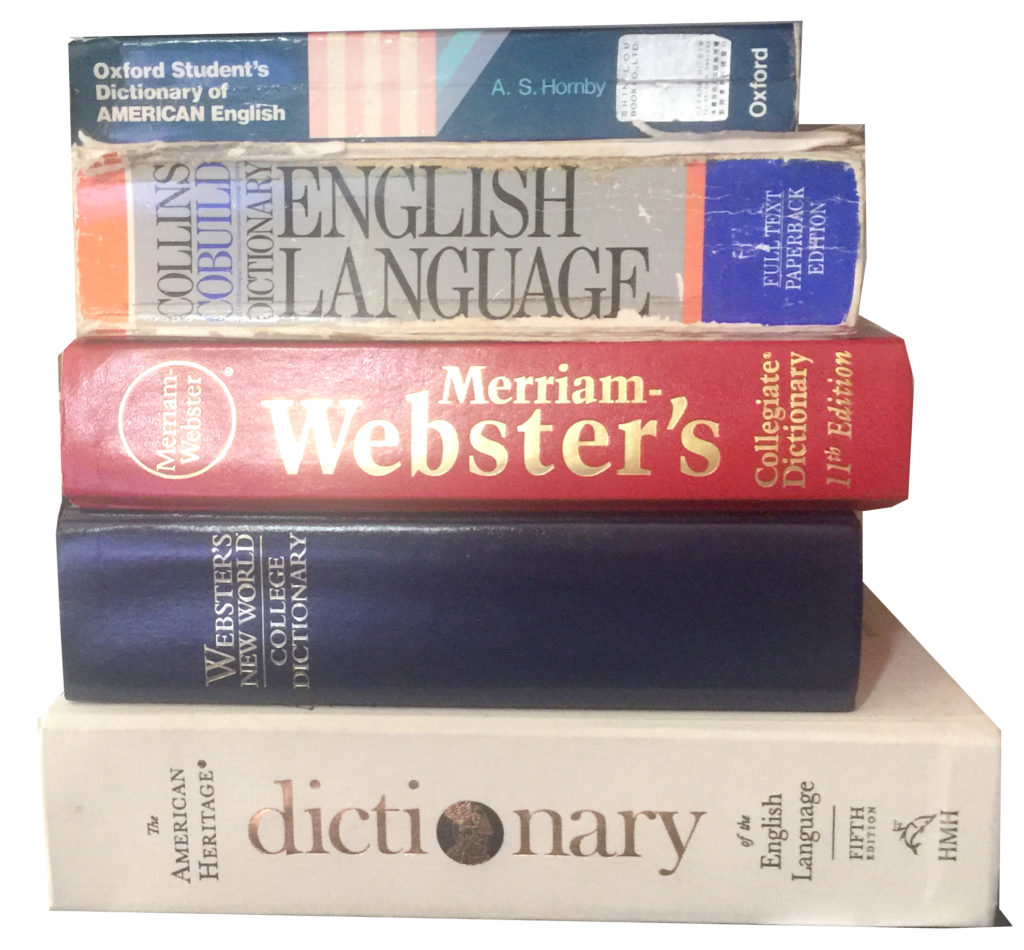
Noah Webster founded a dictionary tradition for American English, giving the country an American standard as opposed to the King’s English, in both word usage and spelling—his blue-backed speller books taught kids spelling for five generations. The Webster brand has long given authority to spelling decisions, even in dictionaries that often disagree with one another. So where are we now on spelling?
Colours of Spelling
As spelling authorities, the most popular American English dictionaries are (1) Merriam-Webster’s dictionaries (the most-recent Collegiate edition and the unabridged edition) and (2) Webster’s New World Dictionary.
Many book and magazine publishers in the United States use The Chicago Manual of Style as a publishing guide on style, usage, and other issues. The guide basically an editor’s bible on everything from grammar and style to indexing. As a spelling authority, Chicago recommends the newest edition of Merriam-Webster’s Collegiate Dictionary (currently the Eleventh Edition). For words not found there, it recommends Webster’s New International Dictionary, Third Edition.
Most newspapers and news organizations, on the other hand, use The Associated Press Stylebook as an editing guide (sometimes alongside their own style guide). As a spelling authority for words its guide doesn’t cover, AP recommends Webster’s New World College Dictionary, a desktop volume the size as Merriam-Webster’s Collegiate Dictionary. The newest edition of Webster’s New World College Dictionary is the fourth. Like the Chicago Manual of Style, AP recommends Webster’s New International Dictionary, Third Edition, for words not found otherwise.
A discussion of Chicago vs. AP can be a bit like a PC vs. Mac catfight. At parties, never discuss religion, politics, operating system or style guide.
Whatever one’s choice is for spelling, though, it is essential to choose an authority and follow it.
Liking Your Conjunctions
But of course, there’s a whole lot more to dictionaries than just spelling. Many writers and editors use The American Heritage Dictionary of the English Language. Its publication was spurred by controversy over Webster’s Third New International Dictionary, Unabridged. James Parton, publisher and co-owner of the history magazine American Heritage, felt the new edition was too permissive. After failing to buy C. & G. Merriam Co. to correct the problem, he contracted the Boston publisher Houghton Mifflin to create an alternative.
Many people prefer The American Heritage Dictionary for its definitions and English usage notes, as well as its beautiful layout. For usage notes, the dictionary has a usage panel, “a group of nearly 200 prominent scholars, creative writers, journalists, diplomats, and others in occupations requiring mastery of language.” It is said, though, that the AHD’s original editor, William Morris, did not always follow the panel’s advice.
The most-recent edition of The American Heritage Dictionary is the fifth edition. It comes in both an unabridged and smaller desktop version. It’s sometimes interesting to see changes in a new edition’s usage notes. For example, if you’ve ever been told not to use like as a conjunction (before a clause) and only as a preposition (before a noun or noun phrase), you’ll be happy to learn that according to the second edition, reputable writers have been using like as a conjunction since the time of Shakespeare. The third edition updated this advice, noting that reputable writers have been using like as a conjunction since the time of Chaucer.
A free online version of AHD is also available at ahddictionary.com. (There’s also, not surprisingly, an app.)
One other Webster-branded dictionary is the Random House Webster’s Unabridged Dictionary. The Random House Publishing Co. entered the reference book market following World War II and produced a rich line of dictionaries. Today the name Random House Webster’s is used on many Random House publications.
These are the standard American English dictionaries, but not the only ones worth consulting. Other useful reference tools include dictionaries for idioms, phrasal verbs, and slang.
Also handy are learner’s dictionaries, which often offer excellent example sentences, and dictionaries for British, Canadian, and Australian English. These latter show not just spelling differences, but differences in idioms and word usage.
For English of all origins, though, it is sometimes usage dictionaries that best cut through style, grammar, and usage discussions. If the American Heritage Dictionary can trace the use of like as a conjunction back to the time of Chaucer and frustrate your child’s English teacher, usage dictionaries from the likes of Houghton Mifflin Harcourt (American Heritage) and Merriam Webster can be truly useful tools for a desktop.
Check out more on all of these in Part Three and beyond.
Better Know Your Dictionaries
- Part 1: How Webster Became a Household Name
- Part 2: Religion, Politics, and Style
- Part 3: Idiom Dictionaries for Pain-in-the-Neck Vocabulary
- Part 4: Sizing Up Phrasal Verb Dictionaries
- Part 5: Slang Dictionaries for Taboo Vocabulary
(C) 2019, by John Sailors. All rights reserved.
